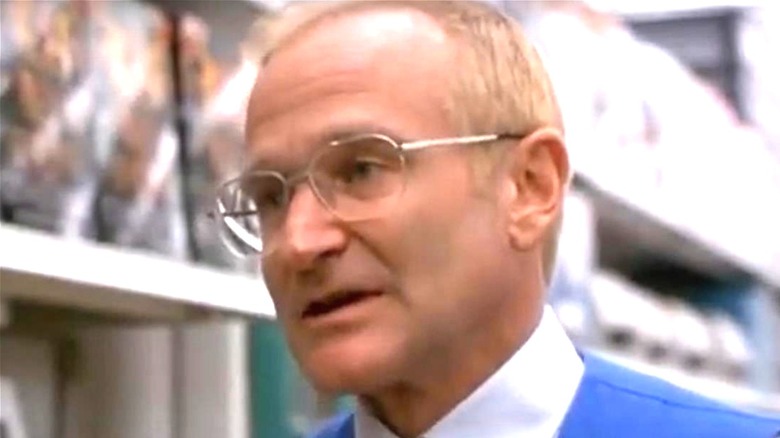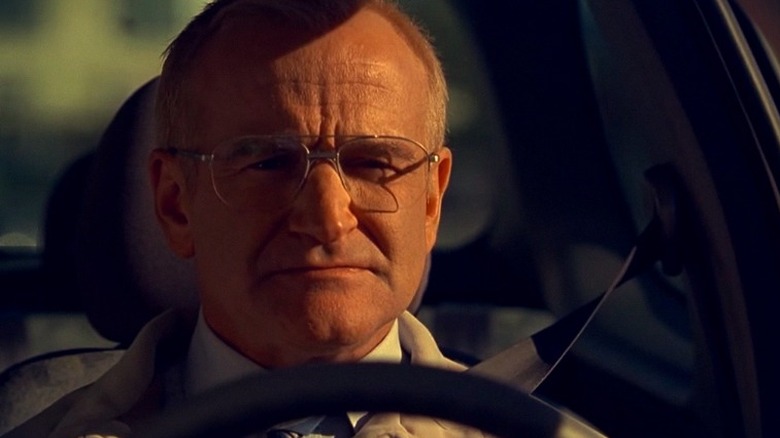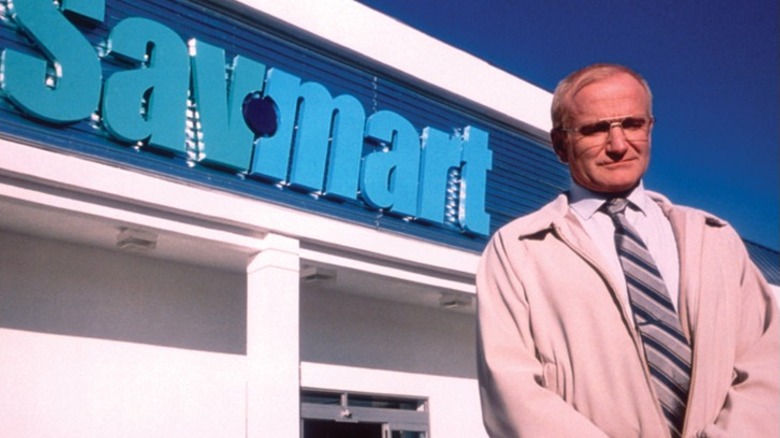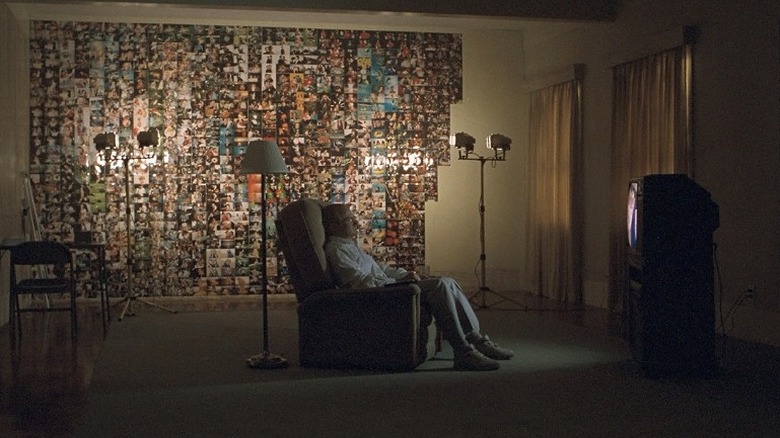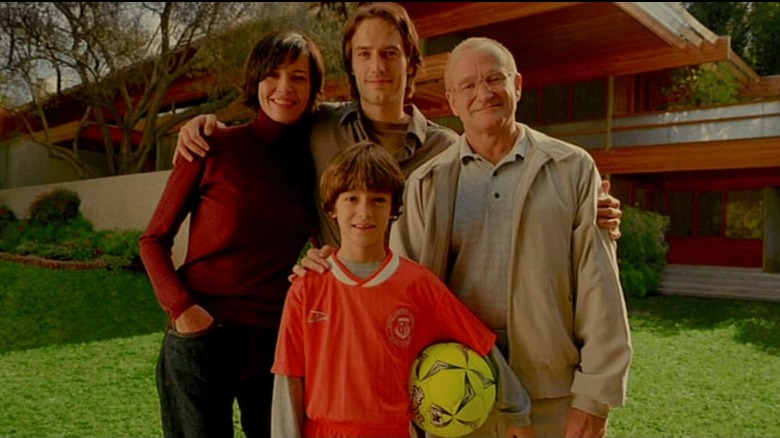The Ending Of One Hour Photo Explained
The 2002 psychological thriller "One Hour Photo" lives on in movie lore as one of Robin Williams' most disturbing acting roles — with an ending that's still talked about nearly two decades later.
There have been many theories about what happens to WIlliams' twisted photo developer Seymour "Sy" Parrish at the conclusion of the film, including whether the entire plot is just going on in his head. But if you delve deep into the backstory and what's being said, including in the director's commentary for DVD/Blu-Ray versions of the movie, then it's possible to gain a better understanding of what's actually going on at the end of "One Hour Photo."
Directed by Mark Romanek, the film focuses on Sy's chilling obsession with the Yorkin family, whom he had met by developing pictures for them. The Yorkins have been going to Sy's one-hour photo location for years, and he's got hundreds of secret copies on his wall at home to show for it. Sy's voyeuristic ways eventually turn violent when he discovers that Mr. Yorkin is having an affair, thus shattering his fantasy of the perfect family that Sy thought they were. Things culminate with a sordid showdown inside a hotel room and Sy's arrest, which later brings a bizarre twist ending that left some viewers unsure of what actually happened.
The final photo shoot
When "One Hour Photo" first came out, one of the biggest things people couldn't stop talking about was the final hotel room scene between Sy and Michael Vartan's Will Yorkin, and this still rings true today. Reddit discussions pop up regularly with new viewers wanting answers about the pivotal confrontation between the two characters, as evidenced by this thread from 2021.
In the scene, Sy manages to ambush Will during a secret tryst with his mistress, Maya (Erin Daniels). He forces the pair to pose naked in various sexual positions while he goes around the room snapping pics of them. Once he is done, Sy tries to escape the hotel but is met outside by police. An investigation had been launched earlier in the film after employees where Sy works discovered photos he took of the store manager's daughter. Sy was using the photos to threaten him after the manager discovered all the copies he had been making of the Yorkins and others. "I just took pictures," he famously tells the cops. The incident leaves Will Yorkin and his lover traumatized, which ultimately appears to be Sy's goal. But why did he do it?
Sy was abused as a kid
After Sy gets arrested, viewers finally find out what has been driving him to act so strangely. He tells Detective James Van Der Zee (Eriq La Salle) that the cop appears to be a good father and would never treat his family badly or force his children to do "things that children shouldn't do," thus implying that Sy was abused as a child.
"You would never take disgusting, sick, degrading pictures of your children doing these things," Sy says, seemingly talking about himself. "Will Yorkin had it all and he threw it away," Sy adds. "He is not a good father." Det. Van Der Zee tells Sy that he "understands now" why he did what he did in the hotel, and also why he had been so obsessed with taking photos of the Yorkins. But there's another twist to be had.
While discussing the film rolls that cops found on Sy at the hotel, Det. Van Der Zee notes how there were only shots of items and random things inside the room, but not Will Yorkin and his mistress. Does this mean that Sy did not take any photos? Or did he possibly imagine the entire confrontation entirely? However, director Mark Romanek explains in the DVD commentary that there is definitely one way viewers should look at the ending.
Sy did what was done to him
As Redditors have pointed out over the years, Romanek and Robin Williams himself have both acknowledged the room for interpretation in "One Hour Photo," but they also agree that there's one main thing that's set in stone. "When [Sy's] fantasy of a wholesome family was shattered, he took matters into his own hands, and did precisely what was done to him: psychological abuse," explained u/adamzissou in a 2015 forum discussion about the film and its DVD commentary. "When he melts down to the detective, you can see that he's pulling from personal experiences, and the cop even says, 'it all makes sense now.'"
As for the missing pictures, most people agree that the reason they weren't on the film rolls was because Sy simply didn't take them. He wanted to torture Will Yorkin psychologically and make him feel how Sy felt when he was a child being photographed by his father. "Sy knew how psychologically damaging it was for him to be forced to take these pictures, so he wanted Will and [Maya] to feel the same for having an affair," said Redditor u/cheecha_meems. "Young Sy must have felt like he wasn't in control of his situation, but he WAS in control with Will & [Maya] in the only way he knew how: by using the same control tactics that his dad used on him."
What does the final family photo mean?
After Sy's interrogation and emotional breakdown in front of the detective, an image of a smiling Sy fades into view. We then pan out to see the rest of the photo, which shows Sy standing next to Nina, Jakob (Dylan Smith), and Will, who has his arms around his wife and Sy. All four wear expressions of joy, yet it's perfectly understandable when you watch this scene if your face creates an expression of confusion. Much like the rest of "One Hour Photo," this moment is rather vague and lends itself to interpretation based on what the film at large divulged.
The most obvious read of this image is that it represents Sy's perceived dynamic with the Yorkin family. Though they didn't reciprocate, he always felt like a part of their unit by living vicariously through their pictures. As u/adamzissou put it, he "stitched himself into their lives." On the other hand, one could take this picture as Sy's image of himself after shedding light on Will and Maya's affair. By doing so, he could see himself as the protector of that perfect, pristine family image he clung to so tightly, which he may think deemed him worthy of their gratitude and acceptance.
Now decades past its theatrical run, it stands to reason that the conclusion of "One Hour Photo" will remain a point of contention for decades to come.
